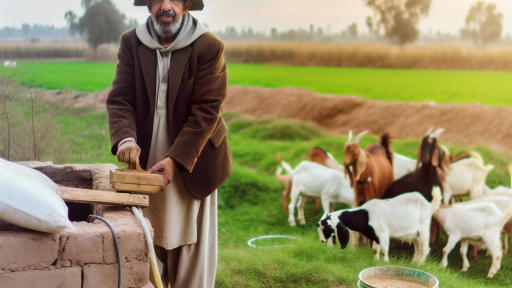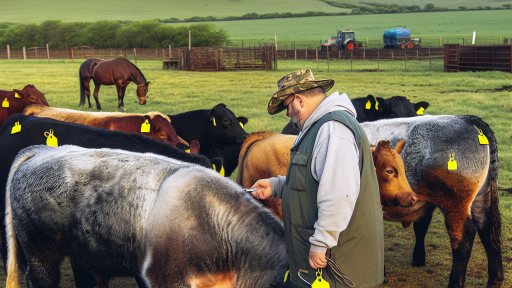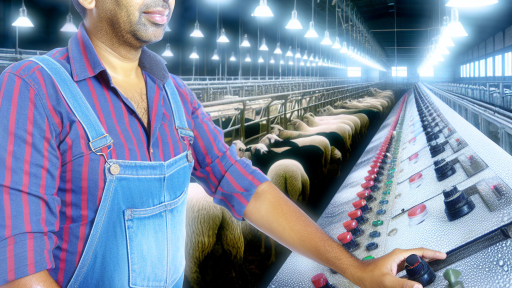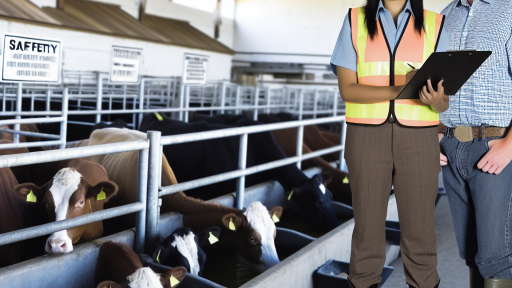Understanding Common Goat Diseases
Overview of Symptoms
Goats can suffer from various diseases that affect their health.
Understanding the symptoms helps in early detection.
Common signs include coughing, diarrhea, and lethargy.
Moreover, a goat may display unusual behavior when sick.
Checking for temperature changes is also crucial.
Common Goat Diseases
Several diseases frequently afflict goats.
Caprine Arthritis Encephalitis (CAE) affects their joints and nervous system.
Johne’s disease leads to severe weight loss and diarrhea.
Pneumonia is common, especially in young goats.
Additionally, internal parasites can cause significant health issues.
Causes of Goat Diseases
Many factors contribute to goat diseases.
Poor nutrition can weaken their immune system.
Exposure to contaminated environments is another risk factor.
Overcrowded living conditions increase stress and disease spread.
Furthermore, lack of proper veterinary care exacerbates health problems.
Transform Your Agribusiness
Unlock your farm's potential with expert advice tailored to your needs. Get actionable steps that drive real results.
Get StartedPreventing Common Goat Diseases
Preventative measures are vital for goat health.
First, provide a balanced diet rich in essential nutrients.
Regular veterinary check-ups help maintain their well-being.
Implementing appropriate sanitation practices is crucial.
Additionally, ensure adequate space for each goat to reduce stress.
Finally, stay vigilant for any signs of illness to take prompt action.
The Importance of Nutrition in Preventing Diseases in Goats
Nutritional Foundations for Health
Good nutrition is the backbone of a goat’s health.
It plays a critical role in disease prevention.
A well-balanced diet strengthens the immune system.
This defense against diseases is vital for goat farming success.
Essential Nutrients for Goats
Goats require a variety of essential nutrients.
Key nutrients include proteins, vitamins, and minerals.
Each nutrient supports different body functions.
For instance, protein aids in growth and repair.
Vitamins like A, D, and E boost immunity.
Minerals enhance bone health and reproductive performance.
The Role of Fiber in Diet
Fiber is crucial for healthy digestion in goats.
It promotes rumen health and nutrient absorption.
Hay and pasture are great fiber sources.
Adequate fiber prevents digestive issues like acidosis.
Water and Hydration
Hydration is often overlooked yet essential.
Clean, fresh water supports digestion and nutrient absorption.
It also helps regulate body temperature in goats.
Dehydration can lead to serious health issues.
Showcase Your Farming Business
Publish your professional farming services profile on our blog for a one-time fee of $200 and reach a dedicated audience of farmers and agribusiness owners.
Publish Your ProfileRegular Monitoring of Nutritional Intake
Farmers should regularly assess their goats’ diets.
Observing body condition helps identify nutritional deficiencies.
Adjusting feed according to the goats’ needs is crucial.
Implementing a good feeding plan ensures optimal health.
Utilizing Natural Supplements
Natural supplements can enhance goat nutrition.
Garlic and apple cider vinegar boost immune function.
Probiotics support gut health and digestion.
Incorporating these can reduce disease risk.
Nutritional Strategies for Health
Nutrition is key to preventing diseases in goats.
Providing a balanced diet is the first line of defense.
Farmers must prioritize health through proper nutrition.
This commitment leads to healthy, thriving goats.
Natural Herbal Remedies for Common Goat Ailments
Gastrointestinal Issues
Goats often suffer from gastrointestinal issues.
Herbal remedies can help alleviate these problems.
Use peppermint to soothe digestive discomfort.
Peppermint has antispasmodic properties that benefit goats.
Chamomile also promotes digestive health.
This herb reduces inflammation in the digestive tract.
Respiratory Problems
Respiratory infections frequently affect goats.
Eucalyptus is an effective remedy for respiratory issues.
Its vapor can relieve nasal congestion.
Thyme is another beneficial herb for lung health.
It possesses antibacterial properties that support recovery.
Skin Conditions
Skin conditions like dermatitis are common in goats.
Calendula is excellent for healing skin wounds.
This herb promotes tissue regeneration.
Aloe vera provides soothing relief for irritated skin.
Apply it directly to affected areas for best results.
Stress and Anxiety
Goats can experience stress due to various factors.
Herbal remedies can help alleviate their anxiety.
Chamomile calms the nervous system in goats.
Valerian root is another effective option.
These herbs help promote relaxation and peace.
Boosting Immunity
Maintaining a strong immune system is vital for goats.
Echinacea is a powerful immune booster.
This herb stimulates the immune response in animals.
Garlic can also enhance goat immunity.
Its antifungal and antibacterial properties are beneficial.
Use these herbs consistently for optimal health.
Gain More Insights: Nutritional Needs of Various Exotic Livestock
Showcase Your Farming Business
Publish your professional farming services profile on our blog for a one-time fee of $200 and reach a dedicated audience of farmers and agribusiness owners.
Publish Your ProfileCreating a Clean and Safe Living Environment for Goats
Importance of Hygiene
Maintaining hygiene is essential for goat health.
A clean environment reduces the risk of infections.
Sick goats can spread diseases to others quickly.
Choosing the Right Location
Select a dry area for goat housing.
Avoid places with standing water or poor drainage.
Good airflow prevents respiratory issues.
Additionally, choose a site with easy access to grazing land.
Designing the Shelter
Build a spacious and well-ventilated shelter.
Ensure it protects goats from extreme weather.
Include proper bedding to absorb moisture.
Regularly clean the bedding to maintain hygiene.
Implementing Biosecurity Measures
Introduce strict biosecurity protocols on your farm.
Limit visitor access to goat areas.
Sanitize equipment and shoes before entering.
Isolate new or sick animals promptly.
Regular Health Checks
Conduct routine health assessments for your goats.
Look for signs of illness or distress.
Schedule regular veterinary check-ups.
Vaccination helps in preventing common diseases.
Establishing a Cleaning Routine
Create a daily cleaning schedule for the goat area.
Remove waste promptly to reduce pathogen buildup.
Wash feeding equipment regularly to prevent contamination.
Maintain a clean water supply at all times.
Educating Staff and Family
Train everyone interacting with goats about hygiene practices.
Educate them about disease signs and prevention methods.
Encourage a culture of cleanliness on the farm.
Involve everyone in maintaining a safe environment.
See Related Content: Essential Guide to Sustainable Fish Farming Practices
The Role of Regular Health Checks and Vaccinations in Disease Prevention
Importance of Regular Health Checks
Regular health checks are crucial for maintaining goat health.
They allow you to identify potential issues early on.
Keeping a close eye on your goats helps prevent disease outbreaks.
Additionally, monitoring vital signs is essential.
You should check their weight, temperature, and overall condition regularly.
These health checks also foster a strong bond between you and your goats.
Moreover, routine interactions help you detect behavioral changes.
These changes may signal health problems that need attention.
Thus, make health checks a regular part of your management routine.
Benefits of Vaccinations
Vaccinations play a vital role in disease prevention for goats.
They help protect your flock against common viral and bacterial infections.
Consult a veterinarian to set up a vaccination schedule.
Showcase Your Farming Business
Publish your professional farming services profile on our blog for a one-time fee of $200 and reach a dedicated audience of farmers and agribusiness owners.
Publish Your ProfileTypically, vaccines should be administered based on age and health status.
This proactive approach reduces the risk of severe outbreaks.
Moreover, vaccinated goats exhibit stronger immune responses.
As a result, they recover more quickly from illnesses.
Additionally, vaccination safeguards not just individual goats but the whole herd.
Creating a Comprehensive Health Management Plan
A comprehensive plan incorporates health checks and vaccinations effectively.
Start by drafting a schedule that suits your goats’ needs.
Involve a qualified veterinarian to ensure you cover all necessary aspects.
Consider integrating herbal remedies to complement vaccinations.
Herbs like garlic and thyme have beneficial properties for goats.
Furthermore, document all health checks and vaccination records.
This documentation aids in tracking your goats’ health over time.
Regularly assess and adjust your plan based on outcomes.
This continuous improvement approach ensures optimum health for your goats.
Explore Further: Lighting Solutions For Livestock Housing
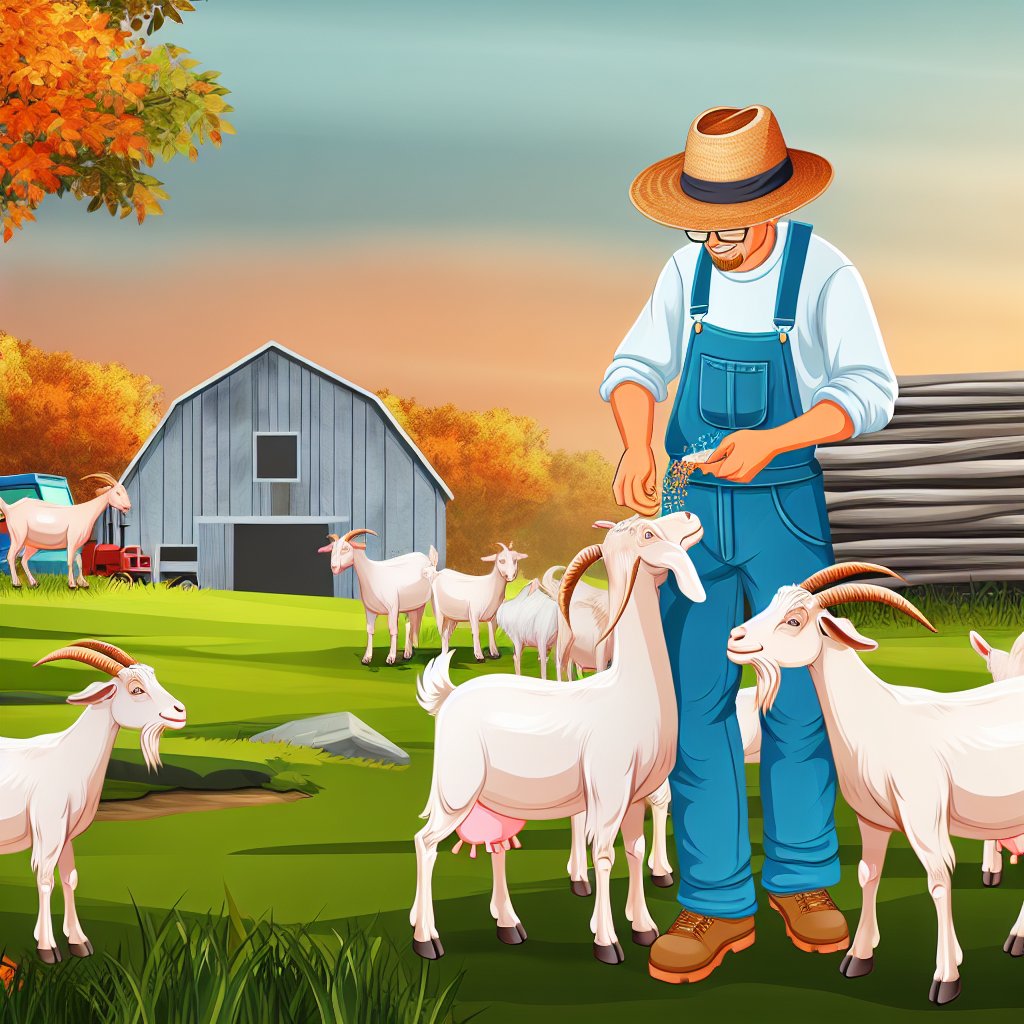
Effective Stress Reduction Techniques to Boost Goat Immunity
Creating a Comfortable Environment
A comfortable environment significantly reduces stress in goats.
Ample space allows them to move freely and express natural behaviors.
Provide clean, dry bedding to promote comfort and prevent illness.
Ensure shelters protect goats from extreme weather conditions.
Establishing a Routine
Establishing a consistent daily routine helps goats feel secure.
Feeding, milking, and exercise schedules should remain regular.
Regular interactions with caregivers foster trust and reduce anxiety.
Consider having the same person handle the goats daily.
Implementing Group Dynamics
Goats are social animals; they thrive in groups.
Keep them in familiar social structures to avoid conflict.
Integrate new goats slowly to prevent stress in existing members.
Monitor group interactions to ensure harmony and safety.
Providing Enrichment
Introducing enrichment activities greatly reduces boredom.
Offer toys, climbing structures, and foraging opportunities.
Naturally, this stimulates their instincts and keeps them active.
Rotate these elements frequently to maintain their interest.
Nutrition and Hydration
High-quality nutrition is vital for strong immunity in goats.
Provide a balanced diet tailored to their specific needs.
Fresh water must always be accessible to keep them hydrated.
Consider adding probiotics to their diet for gut health.
Regular Health Checks
Conducting regular health checks builds a proactive approach to well-being.
Look for signs of stress or discomfort during interactions.
Establish a vaccination schedule to prevent common diseases.
Consult a veterinarian for advice on disease prevention.
You Might Also Like: Implementing Genomic Selection in Livestock
Showcase Your Farming Business
Publish your professional farming services profile on our blog for a one-time fee of $200 and reach a dedicated audience of farmers and agribusiness owners.
Publish Your ProfileIntegrating Rotational Grazing to Minimize Parasite Loads
Understanding Rotational Grazing
Rotational grazing involves moving goats between pastures.
This practice allows for forage recovery and improves pasture health.
Additionally, it helps reduce parasite loads significantly.
Benefits of Rotational Grazing
Rotational grazing contributes to better nutrient management.
It promotes a diverse plant community, which benefits goats.
Furthermore, this method enhances soil health and moisture retention.
Reducing Parasite Exposure
Parasites thrive in overgrazed areas with dense manure.
Moving goats to fresh pastures disrupts parasite life cycles.
This practice minimizes the risk of reinfection among the herd.
Improving Forage Quality
Goats prefer tender, young plants found in newly grazed areas.
Fresh pastures encourage better nutrient intake.
As a result, goats grow healthier and more resistant to disease.
Implementing a Rotational Grazing System
Designate several grazing areas for effective rotation.
Ensure each paddock has sufficient forage for the herd.
Monitor pasture conditions and adjust grazing durations accordingly.
Setting Up Grazing Schedules
Develop a grazing schedule based on pasture growth rates.
Rotate goats every few days or weeks, depending on conditions.
Track grazing patterns to avoid overuse of any single area.
Using Fencing and Water Sources
Invest in quality fencing to manage goat movements effectively.
Provide accessible water sources in each grazing area.
Maintain water quality to support overall goat health.
Key Takeaways
Rotational grazing is an effective method to prevent common goat diseases.
This practice significantly reduces parasite loads while enhancing pasture health.
Implementing a well-structured system promotes healthier, thriving goats.
The Significance of Proper Hoof Care in Preventing Infections
Understanding Goat Hoof Structure
Goats have unique hooves designed for their agile nature.
Their hooves consist of two separate claws, aiding in grip and stability.
However, this structure makes them prone to various infections.
Importance of Regular Hoof Trimming
Regular hoof trimming is essential for maintaining hoof health.
Neglecting this can lead to overgrowth and discomfort.
Furthermore, overgrown hooves can become harbors for bacteria.
This can significantly increase the risk of infections.
Practicing Cleanliness and Hygiene
Maintaining a clean living environment is vital for goats.
Soiled bedding can lead to bacterial growth in hooves.
Regularly changing bedding reduces this risk.
Moreover, keeping feeding areas clean is equally important.
Monitoring for Signs of Illness
It is crucial to regularly check goats for hoof issues.
Look for signs of lameness or swelling around the hooves.
Additionally, inspect for any unusual odors or discharge.
Prompt action can prevent minor issues from escalating.
Providing Proper Nutrition
Nutrition plays a significant role in hoof health.
Showcase Your Farming Business
Publish your professional farming services profile on our blog for a one-time fee of $200 and reach a dedicated audience of farmers and agribusiness owners.
Publish Your ProfileA balanced diet strengthens hooves and boosts immunity.
Incorporating minerals and vitamins is essential for optimal growth.
This dietary approach helps prevent many hoof-related diseases.
Utilizing Natural Remedies
Naturally sourced remedies can support hoof health effectively.
Essential oils may serve as antibacterial treatments.
Furthermore, apple cider vinegar can promote hoof hygiene.
Consider using these remedies as preventive measures.
Additional Resources
Guide for the Care and Use of Laboratory Animals, 8th edition …

